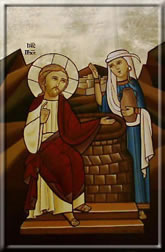- Arabic Corner
- Audio
- Bible Study
- Coptic Reader
- Children's Corner
- Deacons
- Evangelism & Apologetics
- Evangelism Pamphlets
- Interesting Facts
- Literature
- Pigori Productions
- Priests Corner
- Questions & Answers
- Reading Recommended
- Saintly Studies
- Servants Guide
- Sunday School Curriculum
- Sunday School Curriculum-Special Needs
- Youth Corner
The Samaritan Woman: St. Photini
![]() Print
|
Print
|
![]() Send to a friend
|
Send to a friend
|
![]() Bookmark
|
Tweet
|
Bookmark
|
Tweet
|
![]() Back
Back

One day about noon called "the sixth hour" in Biblical times (as it also is in our Agpeya's) our Lord Jesus Christ stopped to rest quietly beside an old well in the desert at the foot of a mountain. He was very tired and very likely thirsty. The Lord Jesus and his followers were on their way to Galilee and had to go through the town of Samaria to reach their destination. It was this city of Samaria, which the disciples were sent to buy food leaving the Lord Jesus alone resting at the well outside the city.
The well where our Lord was resting was known as "Jacob's well". It was a very old and deep well. There was not many wells along the path the Lord Jesus was travelling so it was indeed a welcome site and one frequently visited by those who lived nearby and needed water.
A woman of Samaria came to well where the Lord Jesus was resting with her water jar to draw water. As the Samaritan woman approached the well, the Lord Jesus told her, "Give Me a drink" (John 4:10). The woman from Samaria obviously noting the Lord was a Jew, questioned the Lord's asking her for a drink of water. The Samaritans were a mixed race of people unlike the Jews and it was generally accepted that the Samaritans and Jews did not like each other and often were enemies whom fought one another.
The Samaritan woman was a very sinful woman whom had had many husbands and was openly living with a man outside of marriage when she met the Lord Jesus Christ. She did not have any remorse at all about her shameful life in which she chose to live. The Lord Jesus knew of her sinful ways, told her this lifestyle was wrong, and to confess, repent, and be converted to the Christian faith. She was very amazed and astounded at the all knowing of the Lord Jesus Christ about her life having never seen Him nor Him her.
The Lord Jesus Christ told the Samaritan woman about water that "lived" not that flowed from a stream or ran down the side of a mountain. "Living water" meant the grace of the Holy Spirit giving those who believe in our Lord Jesus and obey Him--eternal life that is they will go to Heaven.
First, the Samaritan woman thought our Lord was a great prophet or leader like Jacob whom the well was named after. She thought this because the Lord told her all the many sins she had committed. When the Samaritan woman left the well and went back to the city she told everyone, "Come, see a Man who told me all things that I ever did. Could this be the Christ?" (John 4:29).
The townspeople people followed the Samaritan woman back to Jacob's well. They asked the Lord to come to their town where they stayed with the Lord and listened to His teachings for two entire days. They did not ask "how much longer was the sermon" or "when will this be over so I can have something to eat and drink". They listened very carefully to all that the Lord Jesus Christ had to say.
This was also earmarked as a great Biblical event as it was the first time our Lord Jesus admitted to being a messenger from God our Father.
On the day of Pentecost the Samaritan woman and her five sisters were baptized. When the Samaritan woman was baptized on the day of Pentecost she took the name "Photini" which means the enlightened one. St. Photini helped to spread the Good News about the Lord. Following her baptism, she became a missionary and was known for her brave Christian teachings. She would give her life and that of her children for the Lord Jesus Christ by refusing to deny the Lord Jesus and His teachings. St. Photini would become forever known as a saint. God blessed St. Photini.
Illuminated by the Holy Spirit, All-Glorious One,
From Christ the Savior you drank the water of salvation.
With open hand you give it to those who thirst.
Great martyr St. Photini, Equal to the Apostles,
Pray to Christ for the salvation of our souls.
(Saints and Sisterhood, Topping)
Questions:
- Who was the Samaritan woman?
- What was her name following her baptism?
- Do you believe the Lord Jesus Christ loved the Samaritan woman a sinful woman?
- Do you believe the Lord Jesus Christ loved her sins?
- Explain what the sinful Samaritan woman did after she heard the teachings of the Lord?
- Did she teach others about the "living water"?
![]() Print
|
Print
|
![]() Send to a friend
|
Send to a friend
|
![]() Bookmark
|
Tweet
|
Bookmark
|
Tweet
|
![]() Back
Back